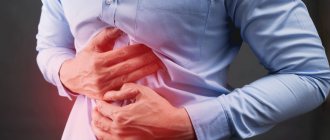Increased gas formation is a symptom of many pathologies of the digestive system. In this case, a person may complain of bloating, pain and discomfort.
Often, increased gas formation appears sporadically and quickly passes, but in some cases this disease poisons the patient’s life for years. The causes of bloating and gas are often quite unobvious.
What is increased gas formation?
Bloating brings considerable discomfort
Increased gas production is also called flatulence. In medicine, flatulence is understood as a symptom of gastrointestinal diseases, characterized by excessive gas production in different parts of the intestine.
Most often, increased gas formation is associated with the activity of intestinal bacteria. Overfilling of the intestines with gas is accompanied by bloating, pain and discomfort.
Flatulence can be of two types: with the release of gas and without the release of gas. The first type is characterized by active release of gas from the rectum. The second type is characterized by increased bloating.
Ways to manifest flatulence
Flatulence in adults is also characterized as swelling or bloating, during which discomfort occurs in the abdominal area, accompanied by rumbling, belching, and sometimes constipation or diarrhea. Attacks of spasms and pain are possible. Flatulence can also occur with the constant release of gases that have an odor. The condition improves significantly after a person has bowel movements. As a rule, such disorders appear in the afternoon, when the digestive system is actively working.
If the accumulation of gases occurs in a certain part of the intestine, so-called local flatulence, pain is observed. When gases are retained at the bend of the intestine, where the spleen is, in addition to the standard manifestations, pain is felt on the left side and severe bloating. Gases in the liver area are manifested by a feeling of overeating and pain on the right side under the ribs and shoulder blade.
flatulence in adults
With flatulence, which occurs due to dysfunction of the small intestine, bloating is observed, while the colon is characterized by a feeling of fullness, distension on the sides. In addition to the standard manifestations, the patient experiences vomiting, shortness of breath, unpleasant belching, heart pain, rapid heartbeat, and general weakness.
Flatulence, which is observed over a long period of time, not only has a detrimental effect on human health (heart problems, insomnia, weakness), but also limits the ability to communicate with other people.
Intestinal gas
Gas formation in the intestines is a normal physiological process. The greatest contribution to this process is made by intestinal bacteria, which produce gas at different stages of metabolism.
Undigested food products enter the human large intestine, which feed the bacteria. The normal microflora of the large intestine produces a moderate amount of gas, but if the balance of bacterial colonies is disturbed, flatulence may develop.
Intestinal gases can consist of carbon dioxide, hydrogen, methane, nitrogen and sulfur dioxide. The latter chemical component gives the gas an unpleasant odor. This gas is typically a byproduct of the enzymatic breakdown of carbohydrates by bacteria.
Causes of bloating and gas
Bloating is common in infants
Bacterial intestinal disorders are just one condition for excess gas production.
For flatulence to occur, it is also necessary to consume certain foods that provoke the activity of intestinal microflora.
Bacteria produce gas during the digestion of residual polysaccharides (starch, cellulose), proteins and some simple carbohydrates.
There are two important features of the appearance of flatulence. If pathogenic bacteria are active in the colon, then for flatulence to occur, undigested food debris must enter this section of the intestine.
If pathogenic bacteria have colonized the small intestine, eating even small portions of provoking foods is sufficient.
The first feature may be associated with certain digestive disorders in which incomplete decomposition and absorption of food occurs in the upper intestines (for example, with pancreatic insufficiency).
The following video will familiarize you with the reasons for increased gas formation:
Diet rules for bloating
Diet as a way to get rid of bloating
When intestinal bloating occurs, nutrition should be structured in such a way as to minimize the formation of gases in the gastrointestinal tract and simplify the process of digesting food as much as possible.
The basic principles of nutrition for flatulence are as follows:
- The daily caloric intake should not exceed the required one. The number of calories necessary to maintain normal life functions is calculated taking into account the constitution, motor and mental activity, and age of the person. For an adult man, this norm is 2000-3000 kcal, for an adult woman - from 1800 to 2200 kcal. Children and older adults require fewer calories than adults.
- You need to leave the table feeling slightly hungry. The fact is that food does not begin to be digested immediately. This process takes from 2 to 4 hours depending on the condition of the body and the products consumed. Therefore, the feeling of fullness comes approximately 20-30 minutes after finishing a meal.
- The daily diet should be divided into 5-6 meals. There is an opinion that a portion of food should correspond to the size of a person’s fist. The last meal should be at least 4 hours before bedtime. 2-3 hours before going to bed, you can drink a cup of kefir or yogurt without sugar.
- Food should be served predominantly warm. Hot food irritates the walls of the stomach, and cold food slows down the digestive processes.
- Products should be consumed boiled and stewed, baked without fat or steamed.
- You can use fruits and permitted drinks as snacks, since these products are not recommended to be consumed with the main meal, so as not to cause fermentation in the stomach.
- It is recommended to cook foods without adding salt.
- In between meals, you need to take a sufficient amount of clean water (1 to 2 liters per day).
- Even the softest food requires thorough chewing. Its particles treated with saliva will be digested faster.
- While eating, you should not be distracted by talking, watching TV, reading or other extraneous activities. The body must be completely absorbed in the process in order to direct all its forces in the right direction.
- The diet should be planned depending on the diseases that accompany bloating and other symptoms (constipation, diarrhea, etc.).
In general, the above principles are not much different from the healthy diet that has become so widespread lately.
Ways to get rid of bloating
Flour products can provoke flatulence
Compliance with preventive measures will help significantly alleviate the condition. You should avoid provoking foods. Foods with small amounts of simple carbohydrates will not cause flatulence.
You need to add dried fruits, lean meat, nuts and eggs to your diet. The most harmful foods are confectionery, fruit juices, soy, cauliflower and Brussels sprouts.
Drinks high in fructose can also cause bloating. It is also very important to understand that each patient has individual provoking foods, so it is necessary to independently determine a safe diet.
Home methods to get rid of flatulence
Folk remedies can help
If bloating cannot be avoided, you can alleviate the condition using traditional medicine. Effective means:
- A decoction of dill seeds. This product contains natural carminative components that improve the evacuation of gas from the intestines. A decoction or tincture of dill seeds can be purchased at a pharmacy.
- Parsley. It is also a fairly common remedy for bloating. You can pour warm water over the parsley and leave for an hour.
- Mint and chamomile. These herbs improve the functional state of the digestive tract and alleviate flatulence. The products can be consumed in the form of tea, tinctures or decoctions.
- Lime juice. To prepare the product, add one tablespoon of juice to a glass of water. The product can be drunk several times a day to relieve the condition.
Not all folk remedies may be effective for a particular patient, so it is necessary to test different ways to alleviate the condition.
When to see a doctor?
Chronic flatulence may be associated with dangerous pathologies that require medical supervision. You should consult a doctor if the following symptoms appear:
- Significant weight loss.
- Pale skin, constant weakness, dizziness, loss of appetite (symptoms of anemia).
- Constant diarrhea.
Diagnostics can reveal the most unexpected causes of pathological conditions. Thus, the causes of bloating and gas are usually related to the characteristics of the intestinal microbiome.
How to avoid becoming a balloon? We get rid of gas formation in the intestines.
Worried about bloating? What to do and are there any proven means to solve this problem?
We asked Aleksey Viktorovich Antipov, a gastroenterologist at Clinic Expert Tula LLC, to talk about a condition such as flatulence and its possible causes.
- Alexey Viktorovich, how can I explain in simple language, understandable even to a first-grader, what kind of problem this is – flatulence?
Surely any person throughout his life has experienced a feeling of bloating, increased accumulation of gases in the intestines. This is flatulence.
- Why does the stomach swell?
The basis is insufficient digestion of the food eaten. This may be due to the very nature of the product (for example, legumes, sauerkraut), errors in nutrition, or to some problems or diseases of the gastrointestinal tract. As a result, food reaches the large intestine in an insufficiently digested form. Here the intestinal microflora begins to influence it, which causes the processes of fermentation and decay. As a result, a larger than normal amount of gases is formed.
It should also be taken into account that gas in the intestines may be in the form of a kind of “foam”. Once formed, it covers the intestinal mucosa, thereby further impairing the absorption of substances and, thus, aggravating the process of gas formation.
-Can flatulence be called a disease?
No, flatulence is a symptom.
- What diseases accompany flatulence?
It can be a symptom of many pathologies. First of all, these are diseases of the digestive system: gastritis, pancreatitis, enteritis, colitis, cholecystitis, cholelithiasis, excessive growth of bacteria in the intestines, dysbiosis, intestinal obstruction, intestinal tumors. Flatulence also occurs with so-called aerophagia (increased swallowing of air during eating), neurosis and some other diseases.
- Alexey Viktorovich, what is included in the diagnostic examination of patients suffering from increased gas formation in the intestines?
Typically, an ultrasound of the abdominal cavity, a general and biochemical blood test, gastroscopy, colonoscopy, and stool tests (general, occult blood, and bacteria) are performed.
How to prepare for an abdominal ultrasound? Ultrasound diagnostics doctor says
LLC "Clinic Expert Orenburg" Poskrebysheva Anna Viktorovna
It should be remembered that the choice of one or another research method is made only by the attending physician based on the specific clinical situation of the patient.
- What to do if a strong accumulation of gases in the intestines does not allow you to live peacefully? Is increased flatulence treatable?
If gas formation has not bothered you before, you should consult a gastroenterologist to find out its cause.
Flatulence, of course, can be treated. However, pills for bloating and gas are not a complete solution, but rather a situational solution to the problem. They can eliminate flatulence “here and now,” but, unfortunately, they will say nothing about its original source. In addition, self-medication has certain risks, and therefore the issue of prescribing medications should be decided only by a doctor.
In addition to the examination, you also need to think about the nature of your diet. Many foods themselves can contribute to increased gas formation and must be excluded from the diet. Your doctor will help you choose the right diet.
You can find out the cost and make an appointment with a gastroenterologist in your city here
(Attention: the service is not available in all cities!)
- Are there traditional methods for treating flatulence? What is their effectiveness?
In our practice, we use only treatment methods with proven effectiveness. I am not aware of any folk methods that meet this criterion, so it is difficult to say anything in this regard. I can only note that in some cases, following advice found, for example, on the Internet, can lead to unfavorable results. So, if a person starts taking, say, a carminative or activated carbon, smecta, this can temporarily reduce or eliminate existing flatulence. But on the other hand, this same period spent on self-medication may be missed, since the cause of bloating may be quite serious.
- Please tell us what can and cannot be eaten during flatulence? Is a special diet prescribed to patients with increased gas formation in the intestines?
Of course, following a diet will yield positive results.
Fermented milk products, porridge (buckwheat, millet), wheat bread made from coarse flour are recommended. Vegetables (in particular, carrots, beets), fruits, and lean beef should be consumed boiled.
In an adult, it is recommended to exclude from the diet foods that cause gas formation in the intestines. This list includes cabbage, grapes, sorrel, gooseberries, legumes, black bread, kvass, beer, sparkling water.
Other related articles:
When is an intestinal MRI prescribed and what does it show?
Have you prescribed a gastroscopy? We undergo diagnostics WITHOUT fear
Colonoscopy of the intestines - is it scary?
For reference:
Antipov Alexey Viktorovich
Graduate of the Medical Institute of Tula State University in 2011.
In 2012, he completed an internship in the specialty “Therapy”.
In 2013, he completed postgraduate professional retraining in the specialty "Gastroenterology", and in 2015 - in the specialty "Endoscopy".
Currently working at Clinic Ekpert Tula LLC as a gastroenterologist.








